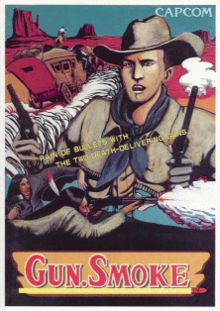Gun.Smoke[6] is a vertically scrolling run and gun video game and designed by Yoshiki Okamoto and released in arcades in 1985.[7] Gun.Smoke centers on a character named Billie Bob, a bounty hunter going after the criminals of the Wild West.
| Gun.Smoke | |
|---|---|
 Arcade flyer | |
| Developer(s) | Capcom |
| Publisher(s) | |
| Designer(s) | Yoshiki Okamoto |
| Composer(s) | Arcade Ayako Mori FDS/NES Junko Tamiya |
| Platform(s) | Arcade, FDS, NES, Amstrad CPC, MSX, PlayStation 2, PlayStation, ZX Spectrum, Xbox, Saturn, Windows |
| Release | |
| Genre(s) | Run and gun |
| Mode(s) | Single-player, multiplayer |
Gameplay
editGun Smoke is a run and gun video game in which the screen automatically scrolls upward. Players use three buttons to shoot left, right, and center. The player can also change the way Billie Bob shoots through button combinations. The player dies by getting shot, struck by enemies, or caught between an obstacle and the bottom of the screen. The player can collect various items, including a horse for extra protection, boots for increased movement speed, bullets for faster shots, a yashichi for an extra life, and a rifle for longer shot range. Other items add points to your score such as stars, bottles, bags, and dragonflies.
Two versions of Gun.Smoke were released in North America by Romstar.[citation needed]
Ports
editGun.Smoke was ported to these systems:
- The MSX
- The PlayStation and Sega Saturn as a part of Capcom Generation 4
- The PlayStation 2, PlayStation Portable and Xbox as a part of Capcom Classics Collection
- The PlayStation 3 and Xbox 360 as a part of Capcom Arcade Cabinet
- The, Nintendo Switch, PlayStation 4, Xbox One, and Microsoft Windows as part of Capcom Arcade 2nd Stadium, referred to as Gan Sumoku.[8]
- Windows 98 and Windows XP as a part of Capcom Arcade Hits Volume 3[9]
- The Amstrad CPC as Desperado – Gun.Smoke; this platform received a sequel called Desperado 2
- The ZX Spectrum
NES version
editThe game was later ported to the Nintendo Entertainment System (NES) and Family Computer Disk System (FDS) in 1988. The game has a new storyline: In 1849, a gang known as the Wingates attacks the town of Hicksville, kills the sheriff, and causes trouble everyday until Billie Bob, the main character, comes to town to free it from the gang. The NES version also has different music.
Soundtrack
editThe soundtrack for the arcade version was composed by Ayako Mori.[10] On August 25, 1986, Alfa Records released a limited-edition soundtrack, featuring all of the music from the arcade version, as well as two unused tracks. Its catalog number was Capcom Game Music – 28XA-94.
Reception
editGame Machine listed Gun.Smoke in their January 1986 issue as being the second most-successful table arcade unit of the month in Japan.[11] The US Play Meter charts listed it as one of the top five arcade games the same month.[12] It went on to be Japan's sixth highest-grossing table arcade game during the first half of 1986.[13]
The arcade game received positive reviews. In a January 1986 issue of Play Meter magazine, Frank Seninsky listed Gun.Smoke as the top recommended arcade conversion kit, calling it "a number-one kit with great graphics."[14] Computer and Video Games magazine gave the arcade game a positive review in March 1986, calling it an "excellent" fast-paced shooter, considering it to be better than light gun shooters such as Hogan's Alley and Shoot Out.[5]
Sequel
editA sequel, titled Desperado 2, was developed by Topo Soft and released in 1991. The game was released on Amstrad CPC, MS-DOS, MSX, and ZX Spectrum.[15][16][17]
See also
editReferences
edit- ^ a b Akagi, Masumi (13 October 2006). アーケードTVゲームリスト国内•海外編(1971-2005) [Arcade TV Game List: Domestic • Overseas Edition (1971-2005)] (in Japanese). Japan: Amusement News Agency. p. 112. ISBN 978-4990251215.
- ^ "Gun.Smoke (Registration Number PA0000291861)". United States Copyright Office. Retrieved 8 June 2021.
- ^ "NES Games" (PDF). Nintendo of America. Archived from the original (PDF) on June 11, 2014. Retrieved August 9, 2015.
- ^ Akagi, Masumi (13 October 2006). アーケードTVゲームリスト国内•海外編(1971-2005) [Arcade TV Game List: Domestic • Overseas Edition (1971-2005)] (in Japanese). Japan: Amusement News Agency. p. 23. ISBN 978-4990251215.
- ^ a b "Arcade Action: Gunsmoke". Computer and Video Games. No. 54 (April 1986). United Kingdom: EMAP. 16 March 1986. pp. 86–7.
- ^ ガンスモーク, Gan Sumōku
- ^ "Gunsmoke". The International Arcade Museum. Retrieved 5 Oct 2013.
- ^ "Capcom Arcade 2nd Stadium: Gan Sumoku for Nintendo Switch - Nintendo Official Site". Nintendo.com. Retrieved 6 September 2023.
- ^ "Capcom Arcade Hits Volume 3: Commando & Gunsmoke - PC - GameSpy". pc.gamespy.com. Retrieved 2022-09-26.
- ^ "森安也子 - みんなで決めるゲーム音楽ベスト100まとめwiki【7/16更新】". 森安也子 - みんなで決めるゲーム音楽ベスト100まとめwiki (in Japanese). Retrieved 2023-07-22.
- ^ "Game Machine's Best Hit Games 25 - テーブル型TVゲーム機 (Table Videos)". Game Machine (in Japanese). No. 275. Amusement Press, Inc. 1 January 1986. p. 35.
- ^ "National Play Meter". Play Meter. 12 (1): 20–1. January 15, 1986.
- ^ "Game Machine's Best Hit Games 25: '86 上半期" [Game Machine's Best Hit Games 25: First Half '86] (PDF). Game Machine (in Japanese). No. 288. Amusement Press, Inc. 15 July 1986. p. 28.
- ^ Seninsky, Frank (January 15, 1986). "Frank's Cranks: Systems/Trivias/Conversions (Part II)". Play Meter. Vol. 12, no. 1. pp. 28–30.
- ^ "Desperado 2 (1991)". MobyGames. Retrieved 2022-09-26.
- ^ GAMART s.c.p (1991), Desperado 2, retrieved 2022-09-26
- ^ "Desperado 2 at Spectrum Computing - Sinclair ZX Spectrum games, software and hardware". Spectrum Computing. Retrieved 2022-09-26.
External links
edit- Gun.Smoke at the Killer List of Videogames
- Gun.Smoke at the arcade history database
- Gun.Smoke: NES Game Coverage
- Desperado at SpectrumComputing.co.uk